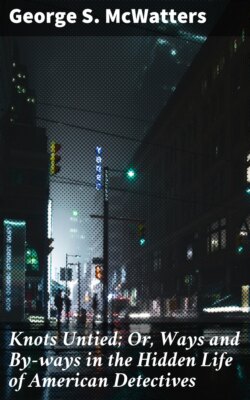Читать книгу Knots Untied; Or, Ways and By-ways in the Hidden Life of American Detectives - George S. McWatters - Страница 20
На сайте Литреса книга снята с продажи.
Mr. McWatters enters the Metropolitan Police Force.
ОглавлениеTable of Contents
Passing over a period in Mr. McWatters' busy life, checkered with incidents and exploits of a marvellous kind in his career as a private detective, as well as much that is interesting of his active participation in many measures of a politico-reformatory and socialistic nature, we find that Mr. McWatters entered the Metropolitan Police force in 1858, wherein he distinguished himself, for the period of twelve years, up to October 17, 1870, when he resigned his post—not only as a most effective and reliable officer in routine duties, but also by many suggestions and plans of enlarging the utility of the force to the community in general. For instance, we find in the New York World, of date November 22, 1860, an article under the head "Information to Railroad and Steamboat Passengers," which dilates, to some considerable extent, and most complimentarily, upon the beneficent results to the public of the operations of a detachment of the police force, "called the Railroad and Steamboat Squad," by which travellers visiting New York, and passing through, were saved from the impositions and robberies of ticket swindlers, hotel runners, unprincipled boarding-house keepers, etc., by encountering the travellers before they leave the cars and steamboats, and giving them all requisite information in regard both to the swindlers, and how best, most safely and economically to conduct their sojourn in the city. The World's article concludes with stating, that "this plan originated with Officer McWatters, who, we know, was for a long time an efficient, and one of the most popular officers attached to this section of the force."
How well Officer McWatters performed his individual duties in connection with this squad, might be illustrated by the quotation of an article entitled "Personal," in the Daily Tribune of July 7, 1860, which is most highly complimentary of Officer McWatters, but is too long to be incorporated here.
Mr. McWatters' onerous vocation as a policeman did not forbid his finding time for earnest participation in many matters not pertaining to his special duties as an officer. Indeed, it would seem that, with all his labors, he found more time to devote to good causes outside of his police duties than many men of leisure and benevolent spirit think themselves able to bestow. It is said that none find so little leisure time to do anything as the wholly indolent and unoccupied, and the more a man has to do of daily labor, the more time can he find to attend to extra calls upon his services. Officer McWatters seems to have practicalized this "doctrine," for, judging from the several hundred extracts before us, taken from the New York journals for the last ten years, one would be led to think that Officer McWatters possessed the attribute or faculty of ubiquity, for we find him "here, and there, and everywhere" in the city, and without it, in attendance upon reform meetings; or advocating humanitary measures from the rostrum, for Officer McWatters is a forcible public speaker. The suffering and starving people of Kansas (1861) we find elicited his warm sympathies and active exertions in their behalf, expressed by the practical mode of raising contributions for their aid. In the Evening Post of October 2, 1861, we find allusion to Officer McWatters as the Secretary of the Patriotic Association of Metropolitan Police (of which, in conjunction with the late Inspector Carpenter, if the writer is not mistaken, Officer McWatters was the originator), which was organized to afford support to the families of policemen who joined the Metropolitan Brigade in the war for the Union.
